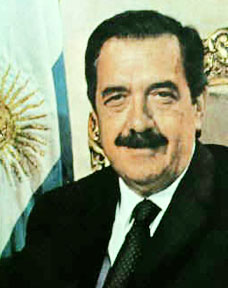Argentines honour former president Alfonsin
 Buenos Aires - Argentines flocked to the national Congress building in Buenos Aires early Wednesday to pay their respects to former president Raul Alfonsin, who died late Tuesday of lung cancer at age 82.
Buenos Aires - Argentines flocked to the national Congress building in Buenos Aires early Wednesday to pay their respects to former president Raul Alfonsin, who died late Tuesday of lung cancer at age 82.
The Argentine government decreed three days of national mourning and a funeral chapel was set up in the Blue Hall of the Congress building for citizens who wish to pay tribute to the man who led the country from 1983-89. He is seen as a symbol of the country's democracy, with his term immediately following the bloody dictatorship in which some 30,000 people are believed to have been killed by pro-government military and paramilitary forces. Most of the bodies have never been found.
His remains were escorted to Congress by a guard of honour and were set to remain there until late Wednesday. He was to be buried in Buenos Aires Thursday.
The social democrat Alfonsin was widely respected in the otherwise deeply divided Argentine political scene, and leaders across the ideological spectrum recalled his achievements Wednesday.
From London - where she is to take part in the G20 summit - Argentine President Cristina Fernandez de Kirchner defined him as "a man of strong convictions." They shared years of political activity and mutual respect, alongside many disagreements, and he was honoured in October at the government palace.
"His figure was inseparably linked to the Argentina's recovery of democracy," she said.
Overnight, hundreds had gathered with candles and flowers before Alfonsin's home in central Buenos Aires. The former president underwent surgery for lung cancer in the United States last year, but his health deteriorated rapidly from Sunday, due to pneumonia.
Alfonsin was one of the founders of the Permanent Assembly for Human Rights shortly before the coup that launched the dictatorship on March 24, 1976.
He chose to enter politics and fight for democracy rather than follow the path of armed struggle adopted by other leaders of the time.
A social democrat from the Radical Civic Union, Alfonsin won the presidential election on October 30, 1983. His inauguration on December 10 that year was a landmark event in Argentina's history.
It was clear at the time that he had been entrusted with a huge challenge. But even skeptics could not have guessed just how hard it was going to be to govern the South American country.
"The situation was not exactly simple," Alfonsin recalled in a recent interview with German Press Agency dpa.
As president, he created the National Commission on Disappeared Persons, which published the document "Nunca Mas," or never again, on the crimes of the dictatorship.
But the military, which ruled from 1976 to 1983, made the going tough for Alfonsin with numerous uprisings. In 1985, several high- ranking members of the military junta were brought to justice, although Alfonsin also promoted immunity for lower-ranking officers involved in human rights violations.
After 13 general strikes and with his government throttled by hyperinflation and a severe economic crisis, Alfonsin handed over power to president-elect Carlos Menem, six months before the formal end of his mandate. (dpa)